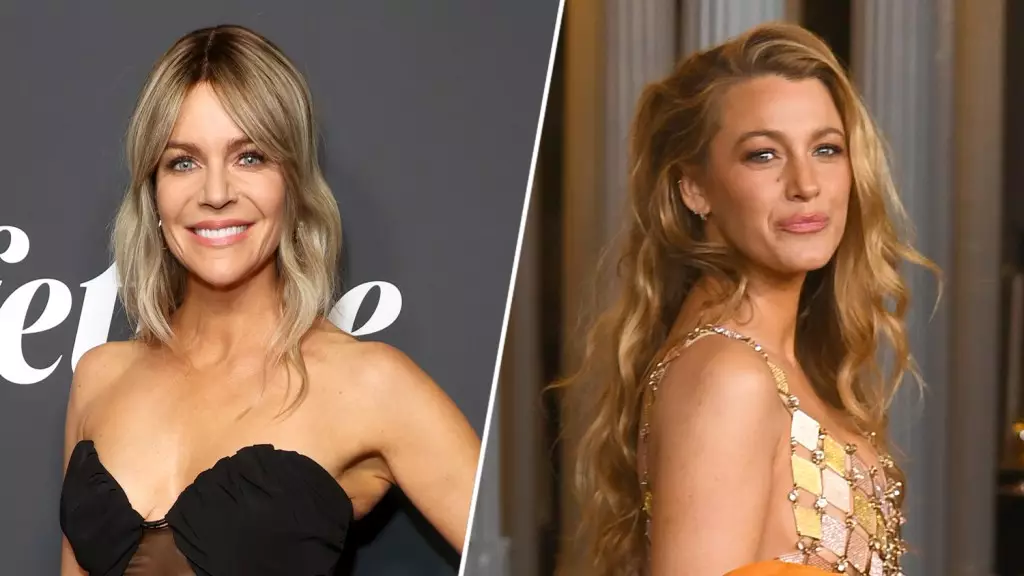In an industry often rife with complexities, the recent conflict involving Blake Lively and Justin Baldoni has magnified the issues of power dynamics, harassment, and reputational warfare within Hollywood. Lively’s allegations against Baldoni, which include claims of sexual harassment and a systematic attempt to undermine her, have polarized opinions and brought forth a cascade of public support from various celebrities, including Kaitlin Olson, who publicly lauded Lively’s character via social media. This situation poses significant questions about workplace ethics, the accountability of influential figures, and the implications of public relations strategies in the entertainment sector.
Blake Lively has taken a bold stance against Baldoni and his production company, Wayfarer Studios, detailing her experiences in a comprehensive complaint that lays bare an allegedly hostile work environment and ongoing retaliatory tactics. In her statement to the media, she expressed hope that her legal actions would unveil the insidious tactics employed against individuals who bravely come forward to expose misconduct.
In contrast, Baldoni remains defiant, asserting through his legal counsel that the accusations are “completely false” and intended to damage his reputation. This stark disagreement has led to an escalating legal battle, as Baldoni’s team reportedly seeks to mount their own counteroffensive against Lively, labeling her actions as a smear campaign against him. Such a tit-for-tat narrative raises pressing concerns about the toxic environment that can thrive in Hollywood—one where allegations are met with equally severe pushback.
The involvement of figures like Kaitlin Olson adds another layer to this unfolding drama. Olson’s public endorsement of Lively as a “kind, lovely, honest and generous person” not only demonstrates solidarity among peers but also highlights the shifting dynamics in how such allegations are perceived by the industry. With Olson’s husband, Rob McElhenney, being closely tied to Ryan Reynolds (Lively’s husband), this support is viewed as an echo of solidarity within a smaller circle of entertainment insiders. It signals a conscious decision within the industry to stand alongside those who come forward, potentially empowering more victims to voice their experiences.
Nevertheless, public opinion splintered into factions mirroring common responses to accusations within the entertainment world—supporters versus detractors. This bifurcation reveals how deeply ingrained biases may shape perceptions of truth in high-profile disputes, often overshadowing the broader implications for workplace culture.
The legal landscape surrounding this incident is becoming increasingly convoluted. Lively’s 80-page complaint includes extensive allegations of a coordinated effort to manipulate the media narrative against her. The mention of text messages tied to crisis communication strategies raises alarms about the power of PR firms in shaping public perception. This is particularly critical in an era where narratives can be twisted into misinformation, exploiting platforms for ideological warfare.
On the other side of the legal coin, Baldoni faces charges from Stephanie Jones, a former associate who claims he is attempting to shift blame for his alleged smear campaign onto her. This lawsuit points to the precarious nature of public relations, where the entanglement of personal and professional relationships can lead to disastrous allegations of defamation and misconduct.
The unfolding saga between Blake Lively and Justin Baldoni transcends personal conflict; it serves as a microcosm of larger conversations around gender dynamics, accountability, and the harsh realities faced by those who speak out against industry giants. With both parties digging in for a protracted legal battle, the outcomes could reverberate through Hollywood, influencing how future allegations are approached both legally and publicly.
As both sides prepare to present their cases, the narrative that emerges will not only impact their careers but also contribute to the ongoing discourse about power, ethics, and resilience within an industry that continues to grapple with its past and present. The Lively-Baldoni dispute stands as a critical reminder of the responsibilities held by those in positions of authority and the consequences of failing to uphold ethical standards in the workplace.


Leave a Reply